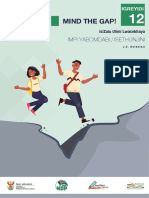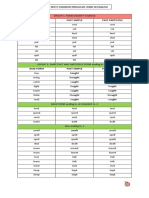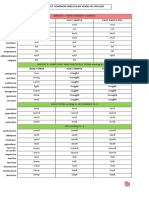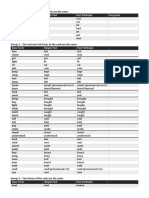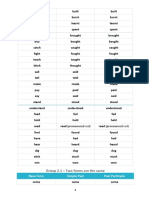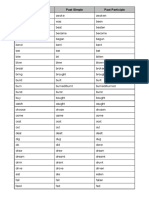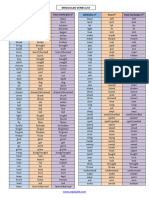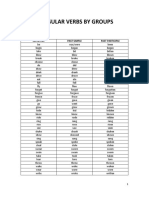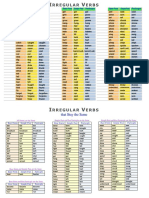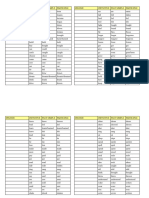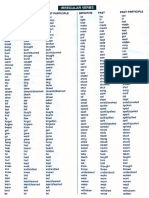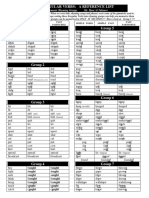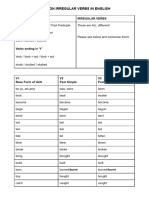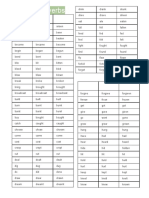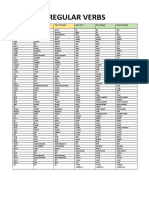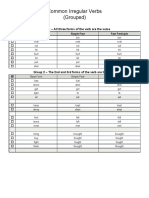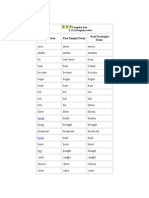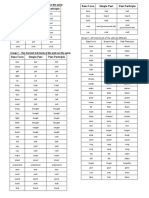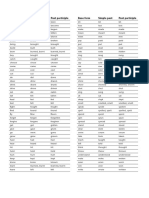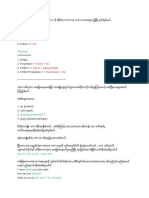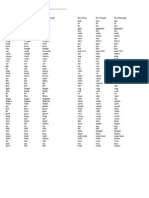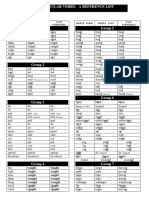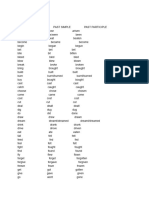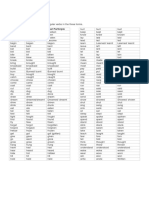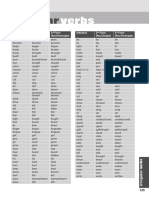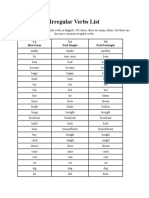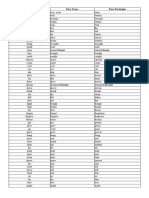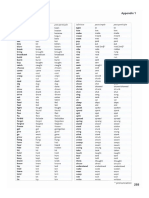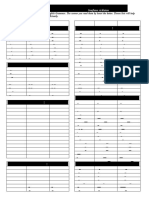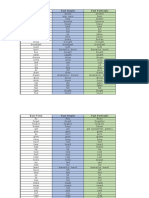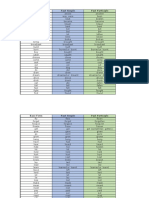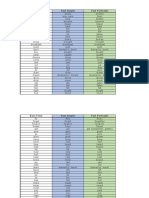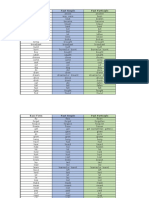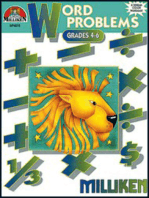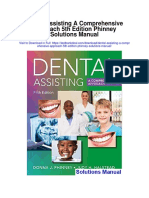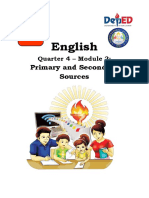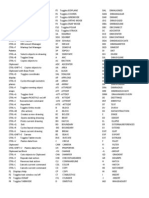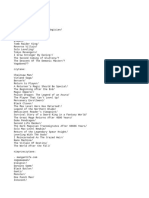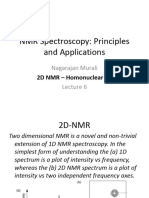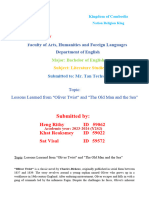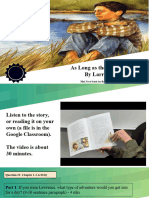0 ratings0% found this document useful (0 votes)
43 viewsThe - Past Simple
The - Past Simple
Uploaded by
amelia poslemanThe document summarizes the most common irregular verbs in English. It groups them into 3 categories: 1) Verbs that don't change form between their base, past, and past participle forms. 2) Verbs that have the same past and participle form ending in "-ought". 3) Verbs that have 3 different forms for their base, past, and past participle. Within each group it provides examples of irregular verbs and their forms.
Copyright:
© All Rights Reserved
Available Formats
Download as PDF, TXT or read online from Scribd
The - Past Simple
The - Past Simple
Uploaded by
amelia posleman0 ratings0% found this document useful (0 votes)
43 views3 pagesThe document summarizes the most common irregular verbs in English. It groups them into 3 categories: 1) Verbs that don't change form between their base, past, and past participle forms. 2) Verbs that have the same past and participle form ending in "-ought". 3) Verbs that have 3 different forms for their base, past, and past participle. Within each group it provides examples of irregular verbs and their forms.
Original Description:
The past simple
Original Title
The_past simple
Copyright
© © All Rights Reserved
Available Formats
PDF, TXT or read online from Scribd
Share this document
Did you find this document useful?
Is this content inappropriate?
The document summarizes the most common irregular verbs in English. It groups them into 3 categories: 1) Verbs that don't change form between their base, past, and past participle forms. 2) Verbs that have the same past and participle form ending in "-ought". 3) Verbs that have 3 different forms for their base, past, and past participle. Within each group it provides examples of irregular verbs and their forms.
Copyright:
© All Rights Reserved
Available Formats
Download as PDF, TXT or read online from Scribd
Download as pdf or txt
0 ratings0% found this document useful (0 votes)
43 views3 pagesThe - Past Simple
The - Past Simple
Uploaded by
amelia poslemanThe document summarizes the most common irregular verbs in English. It groups them into 3 categories: 1) Verbs that don't change form between their base, past, and past participle forms. 2) Verbs that have the same past and participle form ending in "-ought". 3) Verbs that have 3 different forms for their base, past, and past participle. Within each group it provides examples of irregular verbs and their forms.
Copyright:
© All Rights Reserved
Available Formats
Download as PDF, TXT or read online from Scribd
Download as pdf or txt
You are on page 1of 3
100+ MOST COMMON IRREGULAR VERBS IN ENGLISH
GROUP 1: FORM DOESN’T CHANGE
BASE FORM PAST SIMPLE PAST PARTICIPLE
cost cost cost
cut cut cut
hurt hurt hurt
shut shut shut
put put put
let let let
set set set
quit quit quit
hit hit hit
GROUP 2: SAME PAST AND PARTICIPLE FORM ending in -ought
BASE FORM PAST SIMPLE PAST PARTICIPLE
buy bought bought
bring brought brought
catch caught caught
fight fought fought
teach taught taught
think thought thought
seek sought sought
BASE FORM ending in -d CHANGES to -t
lend lent lent
spend spent spent
send sent sent
build built built
Also ending in -t
smell smelt smelt
spell spelt spelt
spoil spoilt spoilt
deal dealt dealt
mean meant meant
learn learnt learnt
feel felt felt
leave left left
meet met met
keep kept kept
sleep slept slept
sweep swept swept
weep wept wept
Ending in -d
feed fed fed
lead led led
hear heard heard
say said said
pay paid paid
hold held held
sell sold sold
tell told told
OTHER COMMON IRREGULAR SAME PAST AND PARTICIPLE FORM
get got got
have had had
make made made
find found found
shine shone shone
shoot shot shot
sit sat sat
win won won
understand understood understood
GROUP 3: THREE DIFFERENT FORMS
Same vowel pattern: / i / / a / / u /
BASE FORM PAST SIMPLE PAST PARTICIPLE
sing sang sung
sink sank sunk
begin began begun
swim swam swum
drink drank drunk
ring rang rung
shrink shrank shrunk
Past participle ending in -en
take took taken
shake shook shaken
give gave given
eat ate eaten
break broke broken
wake woke woken
choose chose chosen
speak spoke spoken
steal stole stolen
fall fell fallen
break broke broken
write wrote written
ride rode ridden
drive drove driven
bite bit bitten
Past participle ending in -own
throw threw thrown
know knew known
blow blew blown
grow grew grown
fly flew flown
wear wore worn
swear swore sworn
tear tore torn
OTHER COMMON IRREGULAR SAME PAST AND PARTICIPLE FORM
be was/were been
see saw seen
do did done
go went gone
You might also like
- Isizulu Novel Impi YabomdabuDocument90 pagesIsizulu Novel Impi Yabomdabuamahle mngadi89% (9)
- English Irregular Verbs ListDocument2 pagesEnglish Irregular Verbs List04Aretta Widanie Lia HapsariNo ratings yet
- Thonny - Python IDEDocument5 pagesThonny - Python IDEKevinPatrónHernandezNo ratings yet
- Base Form Past Simple Past ParticipleDocument3 pagesBase Form Past Simple Past ParticipleNuria Ramos RodríguezNo ratings yet
- 100-Irregular-Verbs-List 230413 141902 230414 07443Document3 pages100-Irregular-Verbs-List 230413 141902 230414 07443Yeiner AndradeNo ratings yet
- 100 Irregular Verbs ListDocument3 pages100 Irregular Verbs ListQuỳnh TrươngNo ratings yet
- Paradigms of Main Irregular English Verbs ListDocument3 pagesParadigms of Main Irregular English Verbs ListdicarloNo ratings yet
- Base Form Simple Past Past Participle: HungarianDocument2 pagesBase Form Simple Past Past Participle: HungarianPetra Gabriella PatakiNo ratings yet
- Irregular Verbs in Alphabetical Order CLT Communicative Language Teaching Resources Oneo - 106957Document2 pagesIrregular Verbs in Alphabetical Order CLT Communicative Language Teaching Resources Oneo - 106957Rahul JadhavNo ratings yet
- IRREGULAR VERBS 8.raz BOOKLETDocument4 pagesIRREGULAR VERBS 8.raz BOOKLETkishobranNo ratings yet
- Irregular Verbs ListDocument1 pageIrregular Verbs ListR.Dario GonzalezNo ratings yet
- Think Level Irregular VerbsDocument1 pageThink Level Irregular VerbsMaria JuneNo ratings yet
- Think Level 3 Irregular VerbsDocument1 pageThink Level 3 Irregular VerbskaticatNo ratings yet
- Irregular Verbs in GroupsDocument3 pagesIrregular Verbs in GroupsCAMILO ANDRES HENAO MARTINEZ75% (4)
- Irregular Verbs ListDocument3 pagesIrregular Verbs ListfilipeNo ratings yet
- Irregular Verbs ListDocument4 pagesIrregular Verbs Listtom100% (1)
- IRREGULAR VERBSDocument2 pagesIRREGULAR VERBSMora DagnilloNo ratings yet
- 6 Sinif 8 Unite Bookworms Konu Anlatimi 2 Irregular Verbs ListDocument1 page6 Sinif 8 Unite Bookworms Konu Anlatimi 2 Irregular Verbs ListGonca RamogluNo ratings yet
- Verbs by GroupsDocument3 pagesVerbs by GroupsPhoenixNo ratings yet
- Andrés Nahum Carrasco Castellano - IRREGULAR VERBS NEW LISTDocument2 pagesAndrés Nahum Carrasco Castellano - IRREGULAR VERBS NEW LISTAndrés Nahum Carrasco CastellanoNo ratings yet
- IRREGULARS LISTDocument2 pagesIRREGULARS LISTelisaNo ratings yet
- Irregular Verbs: Base Form Past Simple Past Participle Base Form Past Simple Past ParticipleDocument1 pageIrregular Verbs: Base Form Past Simple Past Participle Base Form Past Simple Past ParticipleLéa Denise Simões AlvesNo ratings yet
- B1_Verb Table (1)Document1 pageB1_Verb Table (1)Tiên ThủyNo ratings yet
- Verb ListDocument1 pageVerb ListLuis Enrique Hernández PinedaNo ratings yet
- List of Irregular Verbs: Infinitive Simple Past Past ParticipleDocument3 pagesList of Irregular Verbs: Infinitive Simple Past Past ParticipleAndres OlivieriNo ratings yet
- Irregular Verbs: A Reference List: Mnemonic Rhyming Groups Mr. Hani Al TahrawiDocument2 pagesIrregular Verbs: A Reference List: Mnemonic Rhyming Groups Mr. Hani Al TahrawiDaniela Murillo100% (1)
- (B1) Irregular Verbs ListDocument2 pages(B1) Irregular Verbs ListElena Caterev91% (11)
- Common Irregular Verbs in EnglishDocument4 pagesCommon Irregular Verbs in EnglishLoredanaNo ratings yet
- Grammar Vocabulary First and First For Schools Irregular VerbsDocument4 pagesGrammar Vocabulary First and First For Schools Irregular VerbsCOMPU ALEX MORELIANo ratings yet
- Infinitive Past Simple Past Participle Infinitive Past Simple Past ParticipleDocument2 pagesInfinitive Past Simple Past Participle Infinitive Past Simple Past ParticiplemarioNo ratings yet
- Irregular Verbs 1Document1 pageIrregular Verbs 1Gloriada LetiNo ratings yet
- Common Irregular Verbs (Grouped) : Group 1 - All Three Forms of The Verb Are The SameDocument3 pagesCommon Irregular Verbs (Grouped) : Group 1 - All Three Forms of The Verb Are The SameNico100% (1)
- Base Form Past Simple Form Past Participle Form: Complete List A-Z of Irregular VerbsDocument17 pagesBase Form Past Simple Form Past Participle Form: Complete List A-Z of Irregular VerbsPetrescu-Rotundu EmanuelaNo ratings yet
- Irregular Verbs 2024Document1 pageIrregular Verbs 2024Freddy jesus Soto castroNo ratings yet
- Irregular Verbs in GroupsDocument1 pageIrregular Verbs in GroupsΚατερινα ΧαλκαληNo ratings yet
- Irregular English VerbsDocument1 pageIrregular English VerbsAbdennourNo ratings yet
- LI L2 Irregular VerbsDocument1 pageLI L2 Irregular VerbsJahaira LazaroNo ratings yet
- Tense Split View and Grammar PointsDocument5 pagesTense Split View and Grammar PointstinNo ratings yet
- English Grammar - Irregular Verbs (Most Common) : Infinitive Simple Past Past ParticipleDocument4 pagesEnglish Grammar - Irregular Verbs (Most Common) : Infinitive Simple Past Past ParticipleDrum_GRNo ratings yet
- Verbos Irregulares1252684196413Document1 pageVerbos Irregulares1252684196413octavioimilan2324No ratings yet
- Irregular Verbs: A Reference ListDocument2 pagesIrregular Verbs: A Reference ListsebNo ratings yet
- English GrammarDocument3 pagesEnglish GrammarChia HernandezNo ratings yet
- Base Form Past Simple Past ParticipleDocument2 pagesBase Form Past Simple Past Participleralf kenjiNo ratings yet
- Irregular Verbs: Base Form Past Simple Past ParticipleDocument1 pageIrregular Verbs: Base Form Past Simple Past Participlejoan LópezNo ratings yet
- Irregular VerbsDocument1 pageIrregular VerbsGavriella LombardiNo ratings yet
- Irregular Verbs List: V1 Base Form V2 Past Simple V3 Past ParticipleDocument4 pagesIrregular Verbs List: V1 Base Form V2 Past Simple V3 Past ParticiplemovieseekerNo ratings yet
- Irregular VerbsDocument2 pagesIrregular VerbsAnja M.No ratings yet
- Essential Grammar in Use 4th Edition by R. Murphy-Páginas-243-244Document2 pagesEssential Grammar in Use 4th Edition by R. Murphy-Páginas-243-244BrunaNo ratings yet
- Past Tense ListDocument2 pagesPast Tense Listrosetetrisha97No ratings yet
- IRREGULAR VERB LISTDocument1 pageIRREGULAR VERB LISTErick TregliaNo ratings yet
- Irregular VerbsDocument1 pageIrregular VerbsSoraya Muyulema100% (1)
- Table of Irregular VerbsDocument5 pagesTable of Irregular VerbsMaja PericNo ratings yet
- Lista de Verbos IrregularesDocument1 pageLista de Verbos Irregulareskayoconceicao17No ratings yet
- Irregular Past Verb ListDocument1 pageIrregular Past Verb ListZaray YulianaNo ratings yet
- Irregular Verbs Mnemonic Rhyming Groups 2012Document2 pagesIrregular Verbs Mnemonic Rhyming Groups 2012lamlamy200No ratings yet
- IRREGULAR VERBSDocument3 pagesIRREGULAR VERBSyenigerfretelNo ratings yet
- Irregular Verbs PDFDocument3 pagesIrregular Verbs PDFNicole JaramilloNo ratings yet
- Base Form Past Simple Past ParticipleDocument3 pagesBase Form Past Simple Past ParticipleGaloNo ratings yet
- Irregular Verbs-2 PDFDocument3 pagesIrregular Verbs-2 PDFGaloNo ratings yet
- Irregular Verbs PDFDocument3 pagesIrregular Verbs PDFCarolina RojasNo ratings yet
- Non Verbal SymbolsDocument3 pagesNon Verbal SymbolsChristian Joseph Tumbaga100% (2)
- Dental Assisting A Comprehensive Approach 5th Edition Phinney Solutions ManualDocument5 pagesDental Assisting A Comprehensive Approach 5th Edition Phinney Solutions ManualToddChavezjbgz100% (17)
- Simple Past VS PST PerfectDocument5 pagesSimple Past VS PST Perfectashley.monsivaisNo ratings yet
- CMP517 PHP Programming RDocument192 pagesCMP517 PHP Programming RvinitNo ratings yet
- Simon Mucheke: EducationDocument3 pagesSimon Mucheke: Educationmudasir aliNo ratings yet
- SwahiliDocument21 pagesSwahilisenorbanana100% (1)
- Eng-G8 Q4 Module 2Document8 pagesEng-G8 Q4 Module 2Mer LynNo ratings yet
- Autocad Shortcut KeysDocument2 pagesAutocad Shortcut KeysAlfred LucidoNo ratings yet
- 6.1 Introduction-to-AutoCAD-PIDDocument46 pages6.1 Introduction-to-AutoCAD-PIDedisonachNo ratings yet
- 9618 Chapter 25Document2 pages9618 Chapter 25Vasant Kumar SeechurnNo ratings yet
- MangiDocument5 pagesMangikacperkosinski03No ratings yet
- PVT - Aci Anywhere Deploying Vpod: Technical and Configuration Examples For VpodDocument48 pagesPVT - Aci Anywhere Deploying Vpod: Technical and Configuration Examples For VpodEh PhotographyNo ratings yet
- JavaDocument9 pagesJavaXxenttNo ratings yet
- UntitledDocument380 pagesUntitlednellycNo ratings yet
- Generation GapDocument3 pagesGeneration GapDiana RusuNo ratings yet
- Chem 542 Spring2010 Lecture 6Document52 pagesChem 542 Spring2010 Lecture 6Omoshalewa AjayiNo ratings yet
- Resume Biyuni ChalukaDocument2 pagesResume Biyuni ChalukaJenniferNo ratings yet
- LiteratureDocument3 pagesLiteratureDoung PichchanbosbaNo ratings yet
- Training Manual Public May2021Document148 pagesTraining Manual Public May2021ERMIYAS TARIKUNo ratings yet
- As Long As The River FlowsDocument18 pagesAs Long As The River FlowskcchipmanNo ratings yet
- Memory Analysis of EternalblueDocument7 pagesMemory Analysis of EternalblueAgus CrociNo ratings yet
- Automatic SummarizationDocument1 pageAutomatic SummarizationShah Siam Ansary DhruboNo ratings yet
- Trimming BI Apps ODI Repository PDFDocument5 pagesTrimming BI Apps ODI Repository PDFDilip Kumar AluguNo ratings yet
- End of Faith ThesisDocument7 pagesEnd of Faith Thesisfjcsyx0f100% (2)
- Terry Doyle John Tagg Helping Students Learn in A Learner Centered Environment - A Guide To Facilitating Learning in Higher Education Stylus Publishing 2008 PDFDocument213 pagesTerry Doyle John Tagg Helping Students Learn in A Learner Centered Environment - A Guide To Facilitating Learning in Higher Education Stylus Publishing 2008 PDFReglyn YlananNo ratings yet
- A Lover of The Cross-Alfred Zahir PDFDocument105 pagesA Lover of The Cross-Alfred Zahir PDFRaildo S PereiraNo ratings yet
- Greek Anthology 04 New Yu of TDocument440 pagesGreek Anthology 04 New Yu of TLuca Cremonini100% (1)
- Modbus Rtu Ip enDocument5 pagesModbus Rtu Ip enJohnyredblueNo ratings yet
